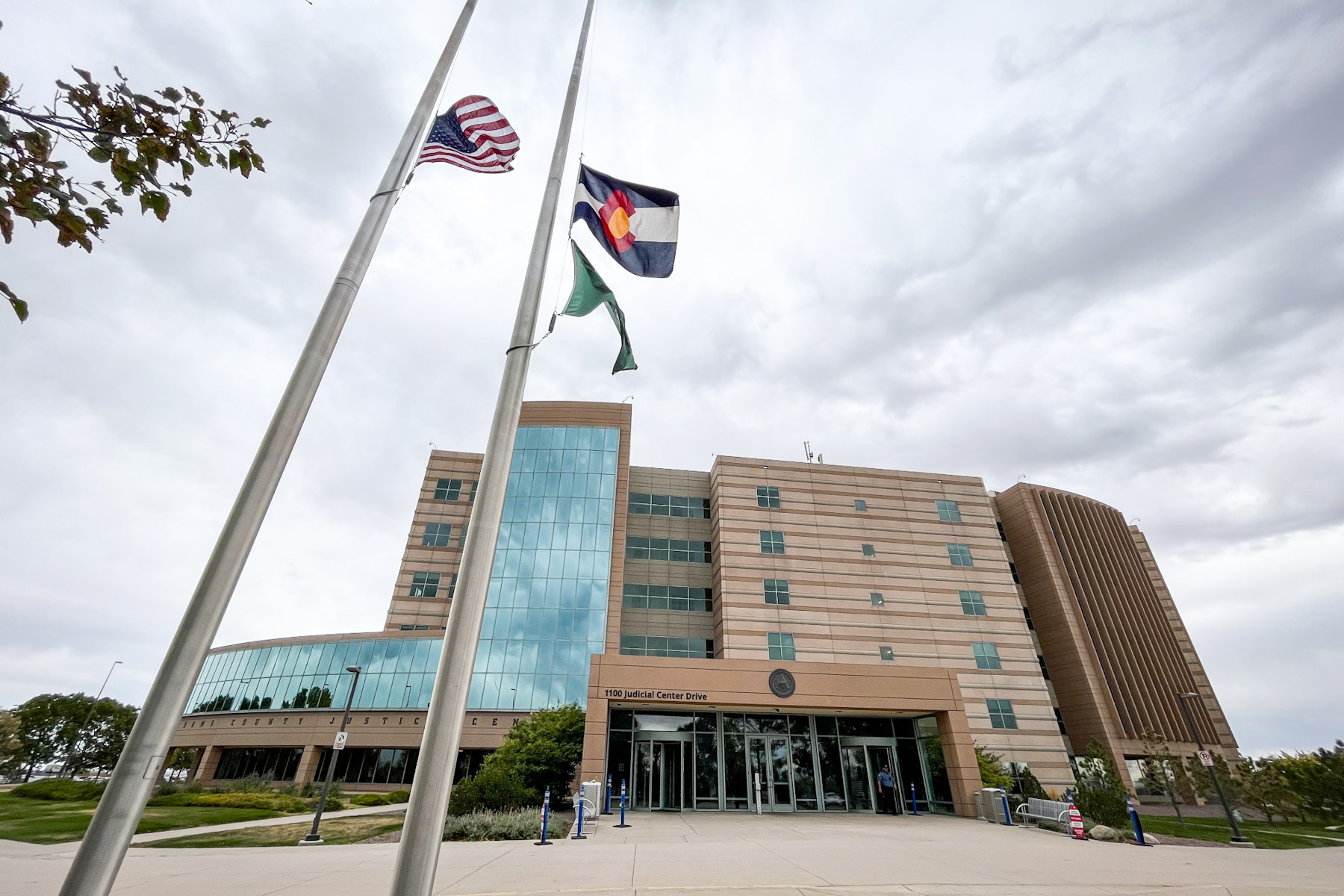
Overview of the trials | Timeline of the Elijah McClain case | Listen to a podcast about the case
What to know right now:
- The verdict has been handed down in this trial. Sentencing for Randy Roedema will be Friday, Jan. 5 at 1:30 p.m.
- One officer was found guilty on lesser charges, another officer was found not guilty.
- There will be three trials for five defendants. The first concerns Jason Rosenblatt and Randy Roedema — both officers arrived moments after their colleague Aurora Police Department officer Nathan Woodyard made initial contact with McClain on a street in August 2019.
Thursday, Oct. 12
9:07 p.m.: Criminal justice advocates heartened by trial but say justice wasn't served
As word spreads through the community about the verdict in the trial of two Aurora police officers charged with killing Elijah McClain, critics of the criminal justice system are wrestling with the outcome.
“This was not the prosecution doing their best job in making sure that both of these individuals were prosecuted,” said Candice Bailey, who has advocated for justice since shortly after McClain died in law enforcement custody. “There is no way one should be guilty and the other one should not, and they had identical acts in this murder.”
Bailey and others plan to organize a candlelight vigil in McClain’s memory.
— Denverite reporter Kyle Harris and CPR News public affairs reporter Andrew Kenney
8:28 p.m.: State lawmakers who've worked on police reform react to verdict
State lawmakers who have worked on policing reform said the split verdict in the trial of two of the officers charged in the death of Elijah McClain indicated that things are shifting with policing in Colorado — but that more needs to change.
“What I want to make sure of is that the policy holds accountable bad actors that exist within law enforcement,” said state Democratic Rep. Leslie Herod of Denver.
Democratic Sen. Rhonda Fields of Aurora represents the area where McClain was stopped by police and was another main sponsor of the 2020 law. She said that while the state has made progress in tangible areas, like requiring body-worn cameras and ending qualified immunity, there’s still a long way to go.
— Bente Birkeland, public affairs reporter
6:02 p.m.: Trial revives past trauma for families
Regardless of the split verdict in the case in which one officer was convicted of criminally negligent homicide and assault while the other was found not guilty of all counts, the very fact that officers were facing charges at all was comforting to the families of others who lost relatives in confrontations with authorities.
“I think that for those officers that took the life of Elijah McClain to be facing criminal charges is absolutely on point,” said Rev. Spencer Booker, speaking in advance of the verdict in the case. Booker said not a week goes by that he doesn’t talk about his brother Marvin, who died in a Denver jail as deputies tried to subdue him in 2010.
His family was awarded a $6 million civil settlement paid by Denver for Marvin’s death. But that’s not justice, said Booker. “No, it never was. It never was enough. Never. You can't buy my brother's life. He's worth more than that to us.”
— Ben Markus, investigative reporter
5:27 p.m.: 'This is the divided states of America'
The Adams County jury deliberated for about two days in reaching their verdict, which was read in a Brighton courtroom with Elijah McClain’s mother, Sheneen, in attendance.
“This is the divided states of America, and that’s what happens,” McClain said to reporters after she walked out of the courtroom with one fist raised in the air — out of anger.
“And that’s it. I’m out. I’m pissed,” she said as she was walking out of the courthouse, arm locked with one of the prosecutors from the Attorney General’s office.
4:52 p.m.: One officer found guilty
One Aurora police officer was found guilty on Thursday for his role in the 2019 death of Elijah McClain. Randy Roedema has been convicted on the lesser charges of criminally negligent homicide and assault in the third degree. The other officer on trial, Jason Rosenblatt, was found not guilty.
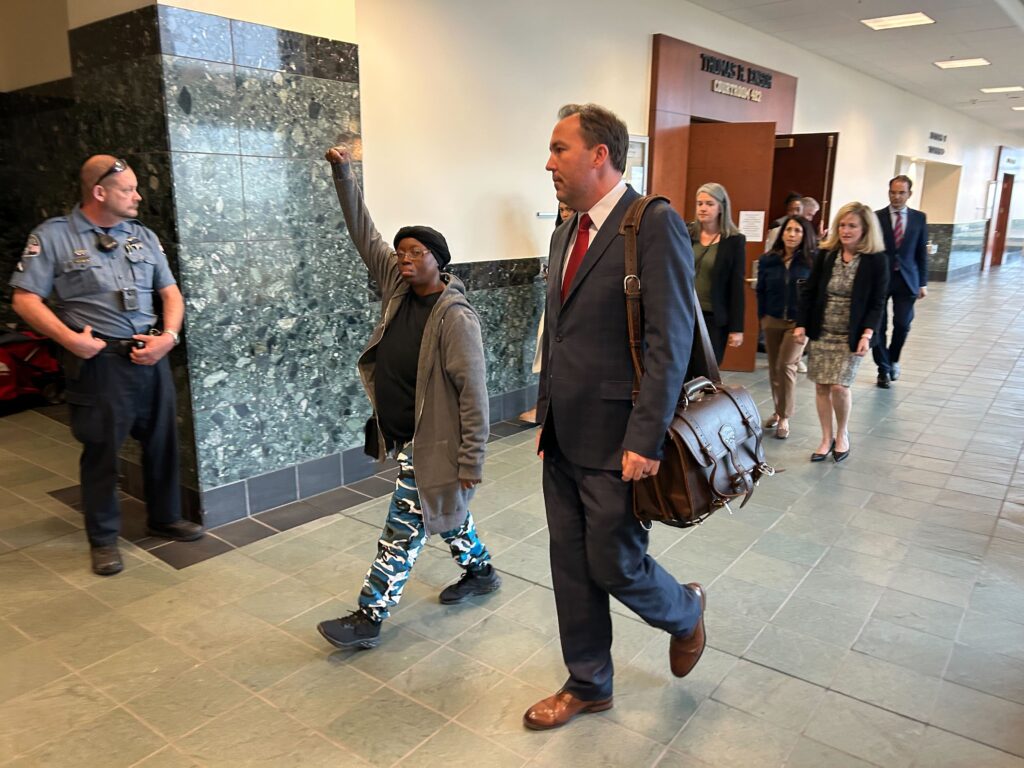
4:22 p.m. The jury has reached a verdict
3:16 p.m.: The jury is still deliberating
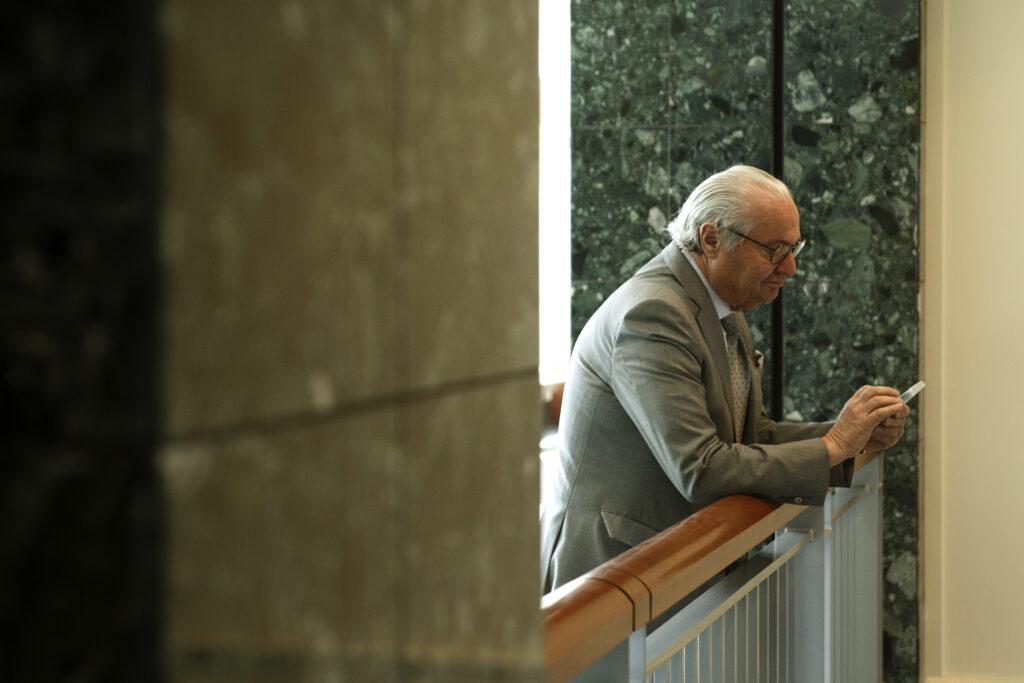
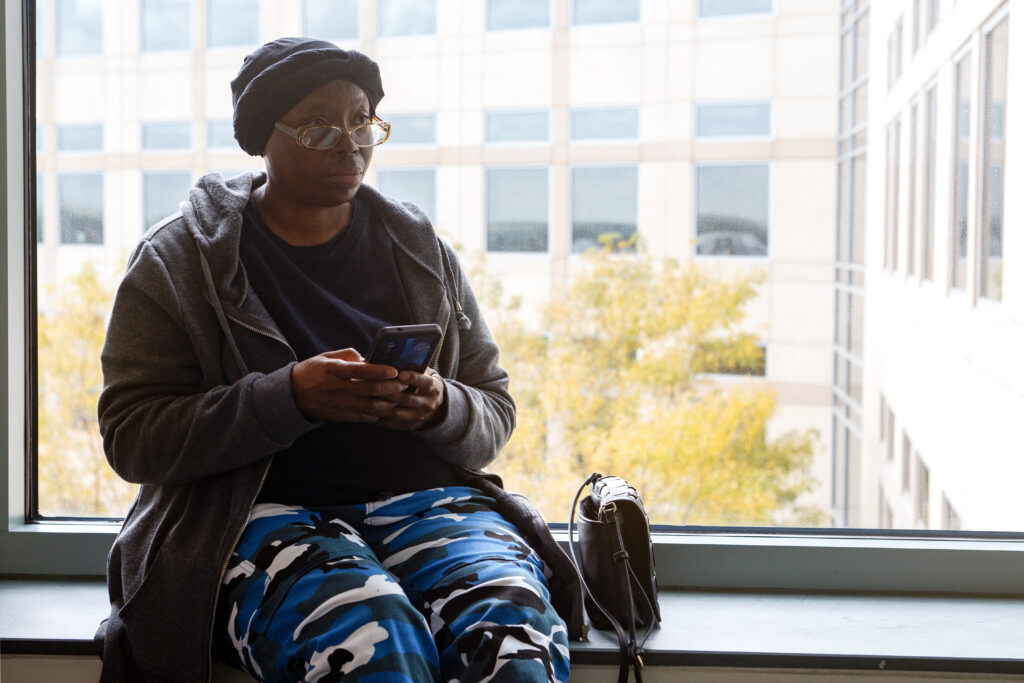
8:58 a.m. Court is back in session and the jury has returned to deliberations
Wednesday, Oct. 11
5:01 p.m. Court dismissed for the day
4:26 p.m. As the jury deliberates in the trial of Randy Roedema and Jason Rosenblatt, the court prepares for the trial of Nathan Woodyard
District Court Judge Mark Warner issued an Expanded Media Coverage order, which details the rules for any photography and audio recording for media outlets inside the courtroom.
— Alison Borden, reporting from the CPR Newsroom
3:01 p.m. While the jury deliberates, an analysis on their options
This week, lesser charges were added in the case against the two police officers on trial for the death of Elijah McClain, which means, according to one local defense attorney, a conviction is more likely.
Denver-based defense attorney Amelia Power, of the firm Power Law LLC, isn’t involved in this case but has represented protesters who were charged after McClain’s 2019 death. She said in a video call on Wednesday afternoon that those added charges give the jury more options to convict.
During jury instructions on Tuesday, Judge Mark Warner told the jury that it can now also consider criminally negligent homicide if they cannot convict on manslaughter which has a higher bar for conviction. The two defendants are also charged with second degree assault. The judge instructed them that if they could not find him guilty for that, that they could consider the charge of third-degree assault, which in Colorado defined as is knowingly, recklessly, or with criminal negligence, inflicting bodily injury on another person.
The thinking, from a defense point of view, is this: “You want to give the jury something to convict on that's less serious than what the person is facing. Because oftentimes, at least in my experience, a jury will say, ‘Something happened. We want someone to take responsibility, but we don't know, but we don't think it's the most serious case.’ ”
— Elaine Tassy, race, diversity and equity reporter, reporting from the CPR Newsroom
10:01 a.m. The jury is in deliberations
Our reporters are at the courthouse waiting for the jury to come out of deliberations. Colorado Courts posted to X, the site formally known as Twitter, that they will post the notice of a verdict.
— CPR News staff at the CPR newsroom
Tuesday, Oct. 10
9:55 p.m.: A closer look at the closing
The state's case can be boiled down to one thing: the officers training. The argument presented on Tuesday pivoted on whether the officers were following protocol about use of force and medical care. The defense teams, however, say that one thing is not about the officers at all -- it's about the ketamine.
The case is in the jury's hands now as deliberations began Tuesday afternoon.
4:53 p.m.: The jury has been dismissed for the day, but not before Judge Mark Warner issued instructions
Judge Mark Warner issued 34 separate instructions to the jury today. In the first instruction, the instructions read "You should consider all the evidence in light of your experience in life." Read the instructions below:
The instructions also included the lesser charges that Randy Roedema and Jason Rosenblatt face if the jury cannot agree on the original charges.
The jury must make a decision unanimously.
The jury was sent home from the deliberation room at 5 p.m. Tuesday and was told to be back to the courthouse to resume at 8:30 a.m. Wednesday.
— Alison Borden, reporting from the CPR newsroom
4:26 p.m.: Gov. Jared Polis on the conclusion of the first trial in the death of Elijah McClain
Colorado Matters' host Ryan Warner spoke with Gov. Polis today and asked the governor about his thoughts on the trial. Here's what Gov. Polis had to say:
"I wanted to make sure a second set of eyes looked at it. The Attorney General did. Charges were brought. It's now being played out in a courtroom appropriately so, and a verdict will be rendered," Gov. Polis said, emphasizing that the executive should not interfere with the judicial branch. "It is firmly in the judicial side. This is not something that should have any influence from elected officials, governor, state senator."
— Ryan Warner, reporting from the CPR Newsroom
4:24 p.m.: Jury begins deliberation
The state has finished its rebuttal. Judge Mark Warner sends 12 jurors to the jury room to begin deliberation.
— Alison Borden, reporting from the CPR newsroom
4:15 p.m.: Jason Slothouber is giving a rebuttal for the state
Jason Slothouber is giving the rebuttal for the state. He's trying to respond to defense claims while urging the jury to rewatch the body worn camera footage.
"You are in the best position to evaluate this evidence because remember Dr. Cina said he only spent a couple of hours reviewing this footage. Dr. Mitchell spent over 20. You guys have spent over three weeks and you can spend as much time looking at the key parts of that footage."
— Alison Borden, reporting from the CPR newsroom
4:03 p.m.: Harvey Steinberg wraps up his closing argument
Harvey Steinberg, Jason Rosenblatt's defense attorney, wrapped up his closing arguments by saying to the jury:
"If you're fair and you subtract emotion out of this, how can you not say not guilty? That has to be the final chapter of this ugly, ugly, ugly story."
The state gets about 30 minutes of rebuttal after the defenses' closings.
— Alison Borden, reporting from the CPR newsroom
3:48 p.m.: Harvey Steinberg makes the point that the jury can convict Roedema and Rosenblatt on separate charges
The jury is allowed to convict Randy Roedema and Jason Rosenblatt on separate charges on their involvement with Elijah McClain. Steinberg tries to hammer that home during his closing statements.
“Rosenblatt didn't jerk his arm. It was Roedema. Rosenblatt didn't have his knee in his back. It was Roedema. People make mistakes when they're excited and under pressure. I get it,” Steinberg says.
— Alison Borden, reporting from the CPR newsroom
3:33 p.m.: Harvey Steinberg, Jason Rosenblatt's defense attorney, is giving his closing argument
Harvey Steinberg is giving an impassioned closing statement for Jason Rosenblatt. It has been punctuated by at least two objections in the first 12 minutes.
— Alison Borden, reporting from the CPR newsroom
3:26 p.m.: Randy Roedema's defense attorney provides final closing argument
In his closing, defense attorney for Randy Roedema, Don Sisson, refers repeatedly to specific testimony heard in the case. He continues to try to discredit the state’s witness on forensic pathology Dr. Roger A. Mitchell because of Mitchell’s advocacy work. He says that Dr. Stephen Cina is the more experienced pathologist, and that Cina testified that ketamine was the cause of death.
Sisson says: “You have the star of the show, Dr. Stephen Cina. I mean the only person in this case, completely objective, not bought and paid for by either side, not selected by either side. What does he say? He says, serious bodily injury can only flow from actual injuries. And I have seen no evidence that injuries inflicted by the police contributed to his death. He's the guy that did the autopsy. The bottom line takeaway on Dr. Cina, he says, I believe in the absence of ketamine, I don't see why he would be dead.”
— Alison Borden, reporting from the CPR newsroom
3:13 p.m.: Moans, sighs and groans
Many moans, sighs, groans and head shaking from people in the courtroom audience during Don Sisson’s closing arguments. Most of the reactions are to the defense of Randy Roedema’s actions while McClain was in custody.
Sisson argues that Roedema was helping McClain back into the recovery position, and there were no complaints from other officers or paramedics. He says McClain reached for Rosenblatt’s gun with intent to “get his power back.”
— Tony Gorman, reporting from the courtroom
3:10 p.m.: Defense attorney for Randy Roedema gives closing argument
In his closing statement, Don Sisson directly responds to what the state presented in its closing.
Sisson says: "Just because there's a tragedy does not mean there's criminality. Now, when it comes to the question of criminality, keep in mind the prosecution bears the burden beyond a reasonable doubt. That's the highest standard in the law. More than highly probable, this means that the evidence presented must be so convincing that no reasonable person could have any doubts of the defendant's guilt."
— Alison Borden, reporting from the CPR newsroom
2:34 p.m.: The defense's closing arguments have begun
Attorney Don Sission is giving closing statements for Randy Roedema.
— Alison Borden, reporting from the CPR newsroom
2:30 p.m.: Prosecution wraps the state's arguments
Duane Lyons wrapped up the state's closing, and the court is in a short recess. The defense will make closing statements after the jury returns.
Lyons said: "This is not just a tragedy, this is a crime. It's unfortunate, but your job here is to evaluate the evidence. All of the evidence points to the inescapable conclusion that these defendants are guilty of the crimes charged. They were trained, they were told what to do. They were given instructions, they had opportunities, and they failed to choose to deescalate violence when they needed to. They failed to listen to Mr. McClain when they needed to, and they failed Mr. McClain and that ultimately led to his death."
— Alison Borden, reporting from the CPR newsroom
2:15 p.m.: Duane Lyons, an attorney for the state, is giving closing arguments
Duane Lyons, an attorney for the state, is giving closing arguments and showing clips of the so-called master sync tape — the enhanced footage of all body worn cameras on the scene.
Lyons said: "Now this case is about several things, but I want to make it very clear what this case is not about. The police officers who investigated that call received a call because of a suspicious person, and no one on the prosecution's team is saying they should not have investigated that call. This is not the case in which we're saying the police officers had no right to investigate. The issue in this case is the amount of force that they used when they encountered Mr. McClain and the choices they made to repeatedly choose force at every opportunity."
— Alison Borden, reporting from the CPR newsroom
1:33 p.m.: Closing arguments have begun
The state is starting its closing arguments. They have the burden of proof in this case.
— Alison Borden, reporting from the CPR newsroom
12:55 p.m.: Judge Mark Warner tells the jury to disregard enhanced body worn camera footage
Judge Mark Warner is instructing the jury to disregard the enhanced body-worn camera footage if they didn't see the actions or hear the words in the original Aurora police body-worn camera footage.
He is also telling them that "reasonable suspicion" and the legality of the stop does not play a role in these charges.
— Alison Borden, reporting from the CPR newsroom
12:47 p.m.: Instructions for the jury
Judge Mark Warner is speaking to the jury about the charges and reminds them they can only rely on evidence presented to the trial — not sympathies, biases or prejudices.
Both Randy Roedema and Jason Rosenblatt may be convicted on lesser charges. Manslaughter includes the lesser charge or criminally negligent homicide, and second degree assault includes the lesser third degree charge.
— Alison Borden, reporting from the CPR newsroom
11:45 a.m.: Elijah McClain's father
The lawyer of LaWayne Mosley, McClain's father, said Mosley has been watching the trial remotely, but will not be making any statements following the verdict.
— Paolo Zialcita, reporting from the CPR Newsroom
11:37 a.m.: Waiting for a printer
We’re waiting as the jury instructions are being printed out before the jury is brought in. It’s several pages long, and apparently there is only one printer, so it’s taking awhile. Prosecutors expect to show the enhanced body worn camera footage today during the state’s closing. I chatted with Sheneen for a few moments before coming in here and she said she’s seen it lots of times but is still bracing herself.
— Allison Sherry, reporting from inside the courtroom
11:20 p.m.: The court is in recess until 12:30 p.m.
Judge Mark Warner has warned the courtroom that anyone with shirts, placards or signs related to the case will be removed. Someone sitting next to me in the courtroom who was wearing a shirt with Elijah McClain on it got up and left.
— Tony Gorman, reporting from inside the courtroom.
11:16 a.m.: Judge Mark Warner is reading instructions to the jury
The courtroom is now officially full. Families of both defendants fill the rows behind the defense table. At least a dozen people from the state are sitting behind prosecutors, as well as family members. Sheneen McClain, Elijah's mother, is in the first row behind the prosecutors flanked by lawyers.
— Allison Sherry, reporting from inside the courtroom.
10:15 a.m.: The court is in recess until 11 a.m.; Closing arguments will begin at 1 p.m.
9:45 a.m.: Closing arguments are expected to begin at 10 a.m. today
Judge Mark Warner and attorneys are reviewing documents before the closing arguments are expected to begin at 10 a.m. The courtroom is almost at capacity. Sheenen McClain and a few supporters are waiting outside.
— Tony Gorman, reporting from the courtroom.
Monday, Oct. 9
4:48 p.m.: Closing arguments are expected to start tomorrow
Judge Mark Warner spent Monday working with state and defense attorneys on jury instructions — what the standard of proof is and whether they can agree on lesser charges. Those instructions will be ironed out tomorrow morning. The closing arguments are expected to start after that at 10 a.m.
The state will have 70 minutes for a closing statement, and the attorneys for Randy Roedema and Jason Rosenblatt will each have 40 minutes. Then the jury will be released for deliberation.
— Alison Borden, CPR News editor
9:16 a.m.: The "selfie incident"
In the pre-trial conference for Woodyard, both sides agree that the "selfie incident" is inadmissible and will not be a part of the trial. The "incident" involved three former Aurora Police officers who took a photo where they mimicked a carotid hold near the site where Elijah McClain died. Two of the police officers were fired; the third resigned. Another officer, Rosenblatt, who is one of the two on trial now, was also fired for receiving a text of the photo and responding inappropriately.
— Alison Borden, CPR News editor
8:32 a.m.: The pre-trial conference for the third officer, Nathan Woodyard, is underway
Nathan Woodyard is the third officer charged in the death of Elijah McClain and will be tried separately from Jason Rosenblatt and Randy Roedema. Judge Mark Warner is asking about jury questionaires and redactions of some of the police body-worn camera footage. Warner says the court will call 130 jurors to begin the selection this Friday at 10 a.m.
— Alison Borden, CPR News editor
Friday, Oct. 6
2:23 p.m.: The court is in recess
Judge Mark Warner has asked the jury to return on Tuesday, Oct. 10 at 9:30 a.m. He said the third officer charged, Officer Nathan Woodyard, has a pre-trial conference on Monday, and the judge wants the rest of that to work on the juror instructions with the defense and prosecution in this case.
— Alison Borden, CPR News editor
2:18 p.m.: Cases laid to rest
The defense for both Roedema and Rosenblatt has also rested their cases.
— Alison Borden, CPR News editor
2:07 p.m.: judge is speaking to the defendants directly about whether they will testify
Neither Jason Rosenblatt nor Randy Roedema will take the stand in the trial.
— Alison Borden, CPR News editor
1:07 p.m.: Rule 29 in play
Because the prosecution has wrapped up its case, the defense now has the option to move for an acquittal. It’s called a Rule 29 motion, and attorneys for both Roedema and Rosenblatt are trying to get a judgment of acquittal.
— Alison Borden, CPR News editor
12:40 p.m.: First issue is “bill of particulars”
The trial is getting deep into procedural issues while this jury is out. The defense is asking for a “bill of particulars,” which is a written statement in which the prosecution has to explain the allegations in a complaint against the defendants in detail. Here’s what’s being said:
Defense attorney for Roedema: Did Mr. Mitchell ever say anything about ‘oh, the conduct of Woodyard, the conduct of Rosenblatt, the conduct of Roedema, the conduct of (EMT Jeremy) Cooper, the conduct of (EMT Peter) Cichuniec?’ No. All of his opinions were about the conduct of the law enforcement, the police restraint. They're apparently using the same evidence for all of these different counts, some of which are based on complicity theories, some of which are based on the actions of paramedics who aren't even in this room.
Defense attorney for Rosenblatt: I do want to emphasize the mental states. Was it reckless or a gross deviation for the paramedics to overdose Mr. McClain? Let's assume it was. Can you tie that to Rosenblatt? Can you tie that Rosenblatt in terms of the complicity theory, somehow should have known that the paramedics would overdose McClain and kill him? The answer's no.
— Alison Borden, CPR News editor
11:19 a.m.: Attorneys argue over definitions of bodily injury and recklessness
The jury is now excused until 2 p.m. as the attorneys continue to argue over the terms that will eventually go to the jury, including specific definitions of bodily injury and recklessness.
An attorney for the defense also says that the prosecution's witnesses testified about "officers" actions and "police" restraint, but did not go far enough to specify the defendants', Randy Roedema and Jason Rosenblatt, actions as the reason for Elijah McClain's death. The attorney is also arguing that Roedema had no medical expertise, and if the reason for McClain's death was ketamine, he shouldn't be charged.
— Alison Borden, CPR News editor
9:50 a.m.: Jury excused for an extended break
Judge Mark Warner has excused the jury for an extended break. He said he and the attorneys need to confer over legal matters that the jury isn't privy to. Warner said he's reviewing notes and wanted to talk to the attorneys at 10 a.m. and have the jury back in their seats by 11 a.m.
— Alison Borden, CPR News editor
9:44 a.m.: Prosecution rests its case
Dr. Mitchell is excused as a witness. Most of his second-day testimony was in direct response to questions asked by the defense yesterday. That included whether paramadic are responsible for a suspect once they arrive on a scene and whether Elijah McClain was put in a recovery position. The prosecution has rested its case.
— Alison Borden, CPR News editor
9:24 a.m.: Expert forensic pathologist is back in court
Dr. Roger Mitchell is back in the court as the trial gets started on Friday. The prosecution is questioning him as a redirect after the cross-examination.
— Alison Borden, CPR News editor
Thursday, Oct. 5
7:20 p.m.: Two pathologists consider same evidence and draw different conclusions
A chief medical examiner and national expert on forensic pathology said Thursday that Elijah McClain’s manner of death is homicide.
As the only witness called to the stand, Dr. Roger Mitchell spent the entire day giving testimony at the trial of the two officers charged in McClain’s death in 2019.
Both Mitchell and Dr. Stephen Cina, the Adams County contracted pathologist who performed McClain’s autopsy and testified on Tuesday, agreed that the cause of McClain's death was “death by ketamine after forcible restraint.”
“I agree with Dr. Cena 100 percent in his cause of death,” Mitchell said.
But where Cina stopped short of determining the manner of death, Mitchell did not equivocate on Thursday. He was asked directly by a prosecution attorney what the proper classification of the manner of death of Elijah McClain’s death would be.
“Homicide,” Mitchell said.
3:00 p.m.: Dr. Roger A. Mitchell believes that Elijah McClain's manner of death is homicide
Dr. Mitchell, national expert in forensic pathology, believes that Elijah McClain's manner of death is homicide. That's different from Adams County's contracted pathologist, who says the manner of death is undetermined. Dr. Mitchell went through police footage on the stand today discussing McClain's worsening condition from being physically restrained.
"At this point in his trajectory towards death, anything that's going to stop him from being able to gain breath, be able to clear his airway is not helping him. It is doing the opposite," he said. "And so watching these videos or watching the hours that I've watched, I'm seeing this as this is really terminal. This is right before he gets the ketamine."
Mitchell says the officers' actions, in addition to the large dose of ketamine, caused McClain's death.
— Alison Borden, CPR News editor
1:58 p.m.: Dr. Roger A. Mitchell is still on the stand answering questions for the prosecution
Dr. Mitchell said there were two kinds of restraint that Elijah McClain experienced during his encounter with Aurora police and paramedics: the physical restraint of handcuffs and being pinned to the ground and the chemical restraint of ketamine. He said both impeded McClain's ability to clear his airway after aspiration and contributed to his death.
— Alison Borden, CPR News editor
12:40 p.m.: The effects of the carotid hold on McClain
Photos from Elijah McClain's autopsy are also being presented in court. The pictures show that McClain suffered abrasions and scrapes, which Dr. Mitchell attributes to being in the carotid hold. McClain neck showed blunt trauma and broken blood vessels in his eyes.
— Tony Gorman, CPR News justice reporter, reporting from the courtroom
12:24 p.m.: Dr. Mitchell argues against diagnosis of "excited delirium"
Dr. Mitchell's testimony makes clear that as a medical examiner and researcher of in-custody deaths, he doesn't believe in "excited delirium" as a medical diagnosis. He points out in the body-worn camera footage instances of what law enforcement tend to look for in excited delirium and how Elijah's McClain's actions and condition don't fit those conditions. Dr. Mitchell calls attention to a part of the footage of McClain where he yelled "ow, ow."
"He's communicating with law enforcement. He's clear on what's going on with him," Dr. Mitchell said. "He's pleading in his case, but one of the big things is at the end where he says he responds to pain. That tells me again, if we believe this notion of excited delirium, one of the things with excited delirium is that you're impervious to pain and that response objectively tells us that he's not impervious to pain, that he's responding to painful stimuli that's being placed upon him."
— Alison Borden, CPR News editor
10:46 a.m.: The prosecution asks Dr. Mitchell to watch footage from the officers' body-worn cameras
The prosecution is asking Dr. Mitchell to watch the footage of the officers' body-worn cameras and identify Elijah McClain's demeanor and whether he's exhibiting "excited delirium." They are also asking Dr. Mitchell to identify when McClain starts to experience respiratory distress. The defense has logged many objections over this testimony, which unequivocally places blame for McClain's death on two of the officers who initially made contact, Randy Roedema and Jason Rosenblatt.
Sheenen McClain, Elijah's mother, is in the courtroom today.
— Alison Borden, CPR News editor
9:33 a.m.: Dr. Mitchell concluded that the police officer's actions, as well as the ketamine, are what killed Elijah McClain
Dr. Roger A. Mitchell concluded in his autopsy on Elijah McClain that the carotid hold and the aspiration of fluid and vomit were results from the forcible restraint by the officers. He says the officers' actions as well as the ketamine are what ultimately killed the 23-year-old McClain.
The conclusion differs from the pathologist who performed the autopsy in Adams County. Dr. Stephen Cina said on the stand Tuesday that McClain's manner of death was undetermined.
— Alison Borden, CPR News editor
9:14 a.m.: Roger A. Mitchell Jr., forensic pathologist, is on the stand
The trial got underway early today. The prosecution called Roger A. Mitchell, Jr., forensic pathologist who is the chair of the Department of Pathology at Howard University College of Medicine in Washington, D.C.
He served seven years as Chief Medical Examiner in Washington, D.C., and specializes in deaths in police custody. He was contacted by the Colorado Attorney General's office to review body-worn camera footage, medical records and law enforcement statements on the death of Elijah McClain. He filed an additional autopsy report on the incident for the grand jury.
— Alison Borden, CPR News editor
Wednesday, Oct. 4
10:51 a.m.: Court is adjourned for the day
Judge Mark Warner is adjourning the jury for the day. The defense decided against calling two witnesses today, and the prosecution has one last witness to call who will not arrive in Denver until this evening.
— CPR News staff
10:30 a.m.: Madison Freeman called to stand
Madison Freeman, a front desk associate at Massage Envy in Greenwood Village, has taken the stand. She worked at the company at the same time that McClain was a massage therapist there.
Freeman testified that Elijah wore running shoes every day to work for his 10-hour shifts. He went running on his lunch hour and she testified that he was very small, "skinnier than me," she said.
— CPR News staff
10:11 a.m.: Ron Ryan talks about the area where Elijah McClain was stopped
Ron Ryan testified that in 2022 and 2023 he personally investigated the area of where Elijah McClain was stopped and restrained. Throughout Ryan's testimony, McClain’s jacket was admitted to evidence by the prosecution. Ryan pointed out there were red substances on the jacket, which had been cut in order to treat McClain.
Prosecutors also admitted McClain’s shirt, pants, shoes and earbuds to evidence. According to Ryan, the shirt and shoes also had the red substance on them.
— Tony Gorman, CPR News justice reporter
9:13 a.m.: AG investigator Ron Ryan on the stand
After admitting a Google Map of the route Elijah McClain took when he was stopped, Ron Ryan is walking the jury through the location where it happened and where the restraint occurred on Billings Street in Aurora.
— CPR News staff
9:07 a.m.: What is "reasonable suspicion"?
The judge and attorneys went back and forth over the term "reasonable suspicion" this morning before the jury was brought into the courtroom. The defense wants Judge Mark Warner to define the term for the jury before the end of the trial, but Warner said he can't because he hasn't heard all the evidence. The prosecution said it didn't matter — because the case is about excessive force and whether Randy Roedema and Jason Rosenblatt were following Aurora Police Department policies or not. The court will return to the issue tomorrow
— CPR News staff
Tuesday, Oct. 3
5 p.m.: The contracted pathologist who can't make up his mind on Elijah McClain's manner of death
After watching hours of body-worn camera footage and consulting with medical experts, Aurora police officers and reviewing pages of medical records, Adams County forensic pathologist Dr. Stephen Cina still can’t make up his mind.
Cina told jurors on Tuesday that Elijah McClain inhaled and choked on vomit, likely both on the ground when he was struggling with officers and wearing a mask and also in the ambulance when he was lying prone on a gurney after receiving a dose of ketamine.
He’s not sure which aspiration could have been lethal -- if it was lethal.
Cina also told the jurors that “more likely than not” McClain, 23, would have recovered “if not for the ketamine.”
— Allison Sherry, CPR News justice reporter, reporting from the courtroom
4:06 p.m.: Restraints played a role
Dr. Cina testified that he changed the autopy's cause of death after he watched extensive body-worn footage from the encounter. He now believes that the restraints may have played a role in McClain’s death.
Cina said that he received death threats over his original autopsy report. When asked by the defense attorneys, he said that he did not request information regarding the case between his original and amended reports. Cina said in his original report that McClain appeared to have recovered from the chokehold because he was shown on body-worn camera footage apologizing.
— CPR News staff
3:15 p.m.: Dr. Stephen Cina on the first autopsy of McClain
Dr. Stephen Cina’s decision on the first autopsy, that McClain’s manner of death could not be determined, came after Adams County Coroner Monica Broncucia-Jordan met with Aurora police officers investigating McClain’s death, according to emails obtained by CPR News through an open records request in 2020.
In addition to meeting with the coroner in the midst of the investigation, Aurora police investigators were also present at the autopsy — even as the actions of some of the department’s officers were under review.
— CPR News staff
2:50 p.m.: Dr. Stephen Cina testifies on McClain's autopsy
Dr. Stephen Cina obtained samples of Elijah McClain's brain, heart and lungs during the autopsy. Portions of the brain were soft and swollen, which Cina said means that it didn’t have any oxygen. McClain’s lungs showed evidence of asthma, aspiration of vomit and inflammation of the lungs’ wall. The lungs were found to be almost twice their original size because of the inflammation due to the aspirated vomit.
The toxicology report from NMS Labs found that the 5’7", 140 lbs-McClain received 1.4mg/L of ketamine. Cina said a therapeutic dose of ketamine ranges from 1.0-6.3 mg/L. He said despite being on the low end of the dosage range, McClain may have received too much. He said the body-worn camera footage showed McClain gasping for breath and experiencing cardiac arrest. Cina ruled complications of ketamine injection after forcible restraint as the cause of death.
— Tony Gorman, CPR News justice reporter
1:45 p.m.: Dr. Stephen Cina called to the stand
Dr. Stephen Cina, a anatomic pathologist and a forensic pathology expert, performed the autopsy on McClain on Sept. 3, 2019. Independently contracted to perform autopsies for Adams County Coroner's Office, Cina said two officers were present at the autopsy of McClain.
On Sept. 23, 2022, the Adams County coroner has changed the cause of death of McClain to ketamine administration following forcible restraint but maintains that the manner of death is “undetermined” — contradicting the state’s case against the police officers and paramedics who are charged in connection to his death.
It’s unclear exactly why the elected Adams County Coroner Monica Broncucia-Jordan and her contracted forensic pathologist, Cina, changed their minds.
In the amended autopsy report made public, Cina wrote that he received new information in the grand jury probe, including extensive body camera footage, witness statements and additional records. He said he requested those back when he performed the original autopsy in 2019, but didn’t get everything.
— CPR News staff
1:15 p.m.: Court is back in session after a lunch break
Defense attorneys want to question a witness over Elijah McClain's 2016 hospitalization for LSD intoxication. Judge Mark Warner partially sustains the defense's motion to question McClain's history of drug use.
— CPR News staff
11:44 a.m.: Back to live stream
The trial is again streaming online. A PIO for the Colorado Judicial Department told CPR News it was a vendor issue that caused the disconnect.
Now on the stand is Aurora police officer Alicia Ward, who was on the scene after Elijah McClain had been taken to the ground and handcuffed.
— CPR News staff
9:44 a.m. The state judicial website that is streaming the trial is down.
— CPR News staff
9:06 a.m.: Order before the court
Judge Mark Warner issued another order that witnesses must testify in person. That means two defense witnesses, one living in Minnesota and the other in Tennessee, will have to travel to Colorado for their testimony.
— CPR News staff
8:54 a.m.: Before the jury is seated
Judge Mark Warner has issued an order about what a forthcoming witness may testify about, and there is discussion about two defense witnesses who want to give their testimony remotely during the morning back-and-forth between the defense and prosecution attorneys.
— CPR News staff
Monday, Oct. 2
8:40 a.m.: The court is not in session today in observance of Cabrini Day
Testimony will continue tomorrow, Tuesday, Oct. 3.
— CPR News staff
Friday, Sept. 29
5:40 p.m.: Policing expert says Aurora officers didn't follow training for when someone says, 'I can't breathe'
A national use of force expert testified Friday that Aurora Police Officers Randy Roedema and Jason Rosenblatt didn't properly follow their own training in handling Elijah McClain in 2019.
Dr. Marc Brown is a former police officer and now an instructor at the Federal Law Enforcement Training Center. He said the two officers facing manslaughter charges in McClain's death should have listened to his cries that he couldn't breathe. Brown said officers were trained that when someone is in respiratory distress they should check in on them and call for medical assistance.
They did call for assistance, but when paramedics got there, they didn't tell them about his condition. Rather, they said he had “superhuman” strength. Defense attorneys pointed to supervising sergeants on the scene who didn't correct the officers and their behavior and the paramedics who also didn't act with urgency.
4:56 p.m.: Jury is dismissed for the day
Officer Darren Dunson was the last witness of the day. The prosecution didn't want to call up another witness with just 20 minutes left in the day. Judge Warner dismissed the jury at 4:45 p.m. and told them to try not to think about this case over the weekend.
— CPR News staff
3:46 p.m.: Aurora officer takes the stand
Aurora police officer Darren Dunson is on the stand. He came on the scene in Aurora after Elijah McClain had been restrained. The prosecution is playing his body-worn camera footage.
— CPR News staff
3 p.m.: A new witness takes the stand
Amanda Kelsey is on the stand. She is a crime scene investigator for the Aurora Police Department. She took photos of the autopsy of Elijah McClain.
— CPR News staff
2:56 p.m.: Dr. Marc Brown excused
Dr. Marc Brown was excused as the only witness to be called on so far today. He testified for more than four hours as an expert on police use of force and national and local police standard practices.
— CPR News staff
1:19 p.m. Back from the lunch break
The defense attorney for Randy Roedema is cross-examining Dr. Marc Brown. The line of questioning suggests that the defense is saying it was the paramedics who failed to care and treat Elijah McClain, not the officers on the scene.
— CPR News staff
11:26 a.m. Reviewing police body-worn footage with use-of-force expert Brown
Prosecution attorney Jonathan Bunge is playing clips of the fatal encounter Elijah McClain had with Aurora police officers and asking the witness to give his opinion on whether the actions complied with Aurora police training, which was detailed yesterday. Dr. Marc Brown has said repeatedly, that from his perception a lot of things went wrong the night of Aug. 24, 2019. He said:
"My opinion is that during the restraint their actions were inconsistent with this directive. During the restraint, Mr. McClain several times complained that he was having trouble breathing and during the restraint period there was no indication that they monitored his breathing or pulse. And when he complained of having trouble breathing, there was no adjustment made to him and he was on his side at the time."
— CPR News staff
10:03 a.m. Dr. Marc Brown takes the stand
The prosecution has called Marc Brown. He is a force and control tactics instructor at the Federal Law Enforcement Training Center and an instructor for Polis Solutions, which specializes in de-escalation, Constitutional policing, diversity, and community trust-building. He was a police offcer for 14 years, mainly in South Carolina.
— CPR News staff
9:21 a.m. Fight between attorneys over witness
The jury has yet to be seated, because the defense is taking issue with the prosecution's witness from the Aurora Police Department who is an expert on use of force. Part of the issue is that the court ordered last week that testimony cannot comment on legal terms such as "probable cause" and "reasonable suspension" — and the previous opinion from this witness is that the stop on Elijah McClain was not legal and he was acting in self-defense. The defense says this back them into a corner, but the prosecution says they won't use legal terms and will only talk to the witness about what happened after the stop. Judge Mark Warner has yet to make a rulling.
— CPR News staff
Thursday, Sept. 28
Police training testimony takes up majority of the day
Aurora Police Sgt. Kevin Smyth testified on various protocols that officers are taught in dealing with suspects including those in respiratory distress and how to apply the carotid hold. The prosecution walked Smyth through PowerPoint slides that were used in the curriculum at the time Both Randy Roedema and Jason Rosenblatt, who are charged in Elijah McClain’s death, were at the academy in 2017.
In effect, the prosecution was showing the jury the things that the officers are trained to do in situations where people struggle or when they say they can’t breathe, drawing lines to what was done that night in the forcible arrest of McClain — and whether the two officers were following protocol or not.
3:24 p.m. Juror No. 4
The judge, prosecution and defense are discussing Juror No. 4. That person has been caught falling asleep or appearing to doze off during the trial. Judge Mark Warner reminded the jury to pay close attention to the evidence and testimony when the court returned from the afternoon break. Warner told jurors that they are welcome to stand up and stretch if they are getting sleepy. Attorneys said they have noticed that Juror No. 4 is more engaged when video evidence is presented.
— CPR News staff
3:15 p.m. Sgt. Kevin Smyth talks about the carotid hold
Prosecutors asked Aurora Police Sgt. Kevin Smyth about police training courses and the carotid hold, which restricts blood flow to the brain causing a person to lose consciousness. He says there are specific protocols when performing the carotid hold, including not doing it repeatedly and checking on a person.
"Once they come back to consciousness, we want to kind of start a little timer and say, hey, if they're not coherent, if they're not answering questions, if they're not appearing normal in that 30 seconds, then it's a medical emergency," Smyth said. "We need to update rescue and provide first aid if we need to."
Elijah McClain was put into a carotid hold twice and was not given medical attention by the officers the night he was forcibly arrested in 2019.
— CPR News staff
2:00 p.m. Sgt. Kevin Smyth walks through a presentation used to train officers
Aurora Police Sgt. Kevin Smyth is answering questions about a PowerPoint presentation he created to train officers; It's a presentation that both defendants sat through. Here's what he had to say about one slide in the required training:
"It's the first slide that introduces this concept of this pervasive saying that's in the medical and law enforcement and sports fields and everything of this, ‘Hey, if you can talk, you can breathe.’ And it's said by coaches, it's said by doctors, it's said by law enforcement, it's said by lots of folks. But we're addressing it because it can actually create a situation where an officer is blind to certain signs if they truly believe this is true.
"This slide introduces a series of slides that talk about how to be able to breathe. It actually requires more than just the components of what it takes to talk. Very simply, we just sort of explain this so that the officers have an understanding of not to be disarmed because someone is still talking. And the idea is that talking only requires the first two.”
— CPR News staff
11:30 a.m. Aurora police officer who oversees training at the department called
Aurora Police Sgt. Kevin Smyth is answering prosecution questions about curriculum of some of the training that he teaches while overseeing the Aurora training academy. He also maintains records for officers and their training.
— CPR News staff
10:55 a.m. What was found in the toxicology
NMS Forensic toxicologist Michael Lamb from NMS Labs testified that lab results found 14 nanograms per milliliter of Delta THC, 31 nanograms per milliliter of Delta-9 carboxy THC, and 4.9 militer of 11 hydroxy Delta-9 THC in Elijah McClain. Those are the chemical components of cannabis. Lamb said he couldn’t make an appropriate opinion on the concentration of marijuana that would equal impairment. Lamb also calculated that McClain had received 7.7 milligrams per kilogram of ketamine, which is more than the 4-6 miligrams for an anesthetic dose -- the dose at which a person is unconscious and may need help breathing.
— CPR's Tony Gorman
9:42 a.m. Forensic toxicologist tested McClain's blood
Forensic toxicologist from NMS Labs Michael Lamb is testifying as an expert in toxicology testing and results. He tested McClain's blood at the lab in Pennsylvania for the presense of ketamine. He said there was 1,500 nanograms of ketamine per milliliter in McClain's blood, but in his role as a toxicologist, Lamb said he can't speak to those results.
He also talked about the cannabinoids in McClain's sample from the night of Aug. 24, 2019.
— CPR News staff
9:31 a.m. The prosecution calls UCHealth nurse
In one of the quickest testimonies so far in this case, nurse Andrea Libhart spoke about drawing blood from Elijah McClain on the night he arrived at the hospital Aug. 24, 2019.
— CPR' News staff
9:09 a.m. The prosecution and defense arguing about the stop on the night of Aug. 24, 2019
The defense is asking for Randy Roedema and Jason Rosenblatt's trial to be severed and a mistrial declared. Judge Mark Warner says he can't make a decision on severing the cases because he hasn't seen all the evidence in the case. He denied the request for a mistrial, again.
— CPR' News staff
Wednesday, Sept. 27
A contentious, shortened day in the courtroom
The day started off with a tiff between the prosecution and the defense over the late disclosure of several witness reports and then was called into a half-day recess to wait on a juror who called in with a death in the family. The tension between the sides only ratcheted up with many off-record discussions at the bench - some lasting as long as 20 minutes. By the end of the day, defense attorney Harvey Steinberg called for a mistrial - for a second time that day.
Aside from the procedural woes, one witness took the stand on Wednesday, Stephen Redfearn, the current deputy police chief in Boulder, was a long-time employee at the Aurora department and eventually oversaw the Aurora Police Department’s Division of Operations. He was a captain on the night of Elijah McClain’s fatal encounter with police.
— CPR' News staff
5:06 p.m. Court is done for the day
Redfearn was excused at 4:45 p.m. The trial will continue on Thursday.
— CPR News staff
4:31 p.m. Redfearn has been on the stand since 12:20 p.m.
Stephen Redfearn spent years in the Aurora Police Department, including time as a trainer and supervisor. As the expert on Aurora police policies and practices, Redfearn was the only witness to testify today. He was subpoenaed to do so.
— CPR News staff
2:28 p.m. Slow going today
After a late start and attorneys spending more time at the bench arguing with each other over evidence admissions than questioning witnesses, Judge Mark Warner noted the slow pace. "We're going like a mammoth in Le Brea," he said.
— CPR News staff
2:08 p.m. Call code change
Yesterday's testimony in the trial of the officers charged in Elijah McClain's death was about the moments before he encountered Aurora police. Today, the testimony is about what happened after. Former Aurora captain Stephen Redfearn . said he changed in the dispatch log from "suspicious person" to "assault on a police officer." He made the change without investigating the incident, reviewing the body-worn camera footage or interviewing any of the officers on scene.
"Before this call was closed out, based upon the information that was provided to me by the sergeants, it went from a suspicious person to an assault based on the information. And so I changed it so it would accurately reflect the information I had been provided," Redfearn testified.
— CPR News staff
1:25 p.m. How the AG got involved in this case
How Colorado’s AG got involved in the case: Adams County declined to press charges in the violent arrest of Elijah McClain, but after protests over police brutality and racial justice in Denver and Aurora, Gov. Jared Polis appointed Attorney General Phil Weiser as a special prosecutor to investigate the death of McClain.
Read the full story.
— CPR News staff
12:23 p.m. Trial resumes with former Aurora officer Stephen Redfearn after Juror 12 agrees to stay on
The court returned from recess with an inquiry into Juror 12. The juror said his uncle died and hasn’t gotten much sleep since. Judge Mark Warner told him that the court will not be in session on Monday, Oct. 2 due to Mother Cabrini Day. The juror agreed to continue.
Once the jury was seated. the prosecution called Stephen Redfearn to the stand. He was a captain in the Aurora Police Department at the time of Elijah McClain's death.
— CPR's Tony Gorman
10:12 a.m. Court in recess until noon.
Juror No. 12 has asked to remain with family until at least noon, so without a seated jury, Judge Warner excused everyone until then. He expects the jury to convene at the courthouse at noon. Defense attorneys recommended Juror No. 12 not be excused because he didn’t specify he could not serve on the jury. Warner plans an inquiry for Juror No. 46 in case Juror No. 12 is unable to show up.
There is still issues with the prosecution's late disclosures of reports on former witnesses that now also includes Dr. David Beuther. Defense attorney Harvey Steinberg asked the judge for a mistrial. Prosecution admitted the lapse in timely sharing of evidence, but said it could be easily remedied by recalling witnesses to the stand.
In regards turning over reports, the court ordered that the prosecution must do so 12 hours so the defense can prepare. For a minor witness, at least 4 hours.
— CPR's Tony Gorman
9:26 a.m. Some procedural issues
Judge Mark Warner announced that juror No. 12 has called in with a death in the family and may not show up today. Warner asked the prosecution and defense to "think about what to do about that."
Meanwhile, the defense is taking issue with a late disclosure from the prosecution -- apparently supplemental reports regarding yesterday's testimony from lab specialist at NMS Labs Robert Hessler and former Aurora Lt. Bob Wesner. The defense may request those witnesses return to the stand for another cross-examination with the late disclosure. The prosecution said they are willing to bring people back to the stand.
— CPR News staff
9:04 a.m. Waiting for the jury
The court is again waiting for a late juror. The prosecution is expected to call another witness to the stand. City of Aurora 911 dispatcher Paula Hull will return to the court later today to wrap up her cross-examination.
Tuesday, Sept. 26
Details emerge about the night Elijah McClain fatally encountered Aurora police
Day four of the trial of the two Aurora officers charged in the death of Elijah McClain revealed more details about what occurred the night of Aug. 24, 2019.
People on the stand Tuesday included the owner of the convenience store where McClain was seen on surveillance video buying iced tea, the call taker for Aurora that first entered the 911 call as a “suspicious person” in the system, and the dispatcher who called for a one-officer car and backup to the intersection where McClain was seen in a coat and ski mask, waving his arms.
— CPR's Tony Gorman and Alison Borden
5 p.m. Court is adjourned for the day
The Aurora 911 dispatcher Paula Hull will be on the stand for a cross examination on Wednesday - but later in the day because she told the court she has an overnight shift on dispatch tonight.
4:12 p.m. Second dispatcher who sent officers to the scene on the stand
Paula Hull testified about the information that is sent to police officers from dispatch when checking on a "suspicious person" call. The call was to the intersection of East Colfax Avenue and Billings Street in Aurora. Hall sent a one-officer car and backup to that intersection on the night of Aug. 24, 2019. The defense continued to call the area a "high crime" location.
3:15 p.m. 911-dispatcher from Aurora talks about phone system
Deborah Furler, the dispatcher for the city of Aurora, took the 911 call that prompted the police to stop Elijah McClain as he was walking home on the night of Aug. 24, 2019. The entire 911 call was played for the jury. Furler detailed how calls come in, how they are answered and other dispatch procedural questions.
2:32 p.m. Gas station owner testifies
Raminder Aulakh, the owner of the gas station where Elijah McClain bought iced tea on the night of Aug. 24, 2019, before his encounter with Aurora police. The prosecution showed security camera footage from the store's 16 cameras. The defense asked question about how common crime is in the area and whether it's unusal for customers to wear coats and masks. Aulakh said her primary concern is shoplifting and that someone wearing a mask in the store wasn't specifically a cause for concern.
— CPR News staff
1:34 p.m. Former Aurora police lieutenant directed to collect extensive files
After a third employee from NMS Labs, Rachel Davidovics, who tested Elijah McClain's blood sample for ketamine, the prosecution called former Lt. Bob Wesner. He collected training records, investigation documents, body-worn camera footage for officers who are on trial, Randy Roedema and Jason Rosenblatt, on request from the Colorado Attorney General's office. Most of the questions for Wesner were about attendance and training materials.
— CPR News staff
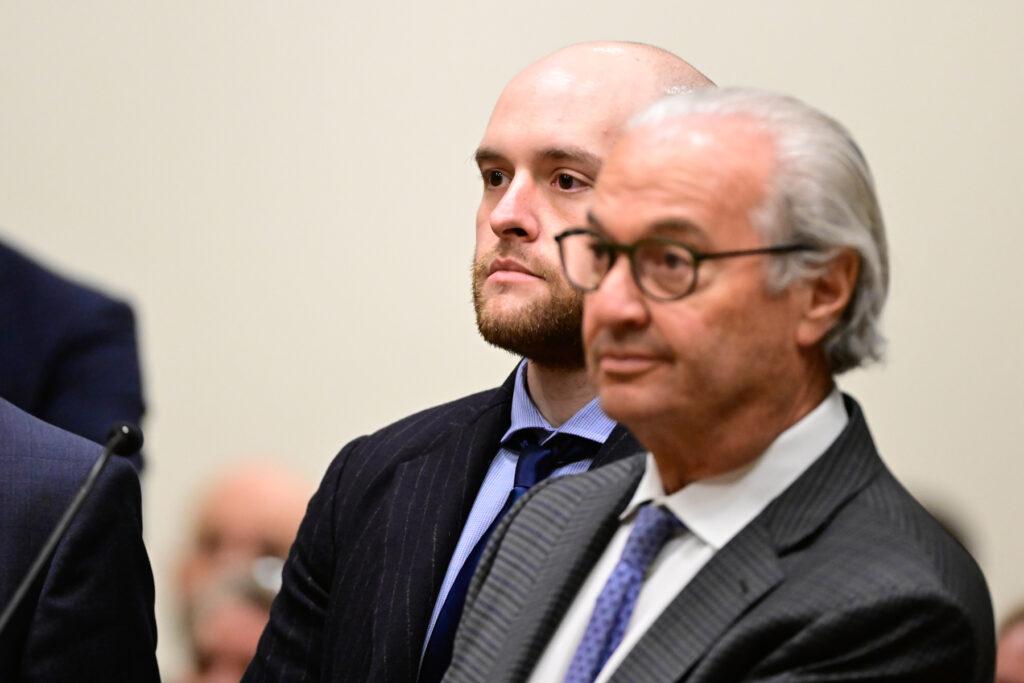
11:22 a.m.: A second employee from Pennsylvania toxicology lab on the stand.
An analyst in the toxicology lab at NMS Labs, Allison Rosengarden is testifying. Her role as an analyst involves determining what chemical compounds are found in human blood samples. She performed the "toxic screen panel" that tests for 200 different chemical compounds on a blood sample from Elijah McClain.
— CPR News staff
11:22 a.m.: Prosecution calls another witness
A lab specialist at NMS Labs, a toxicology laboratory in Pennsylvania, has been called to the stand. Robert Hessler tested Elijah McClain's blood that was drawn at the hospital for cannabinoids - chemical compounds found in cannabis. Elijah McClain's autopsy reported he had cannabis in his system when he encountered the Aurora Police in 2019.
— CPR News staff
9:17 a.m.: Jury is all here
The cross examination of Dr. David Beuther continues with attorney Harvey Steinberg. Beuther testified on Friday about Elijah McClain's medical condition, including how he aspirated vomit during his forcible arrest.
— CPR News staff
9:12 a.m.: Holding up the trial
The court is waiting for one late juror to arrive at the Adams County Justice Center before starting proceedings this morning.
— CPR News staff
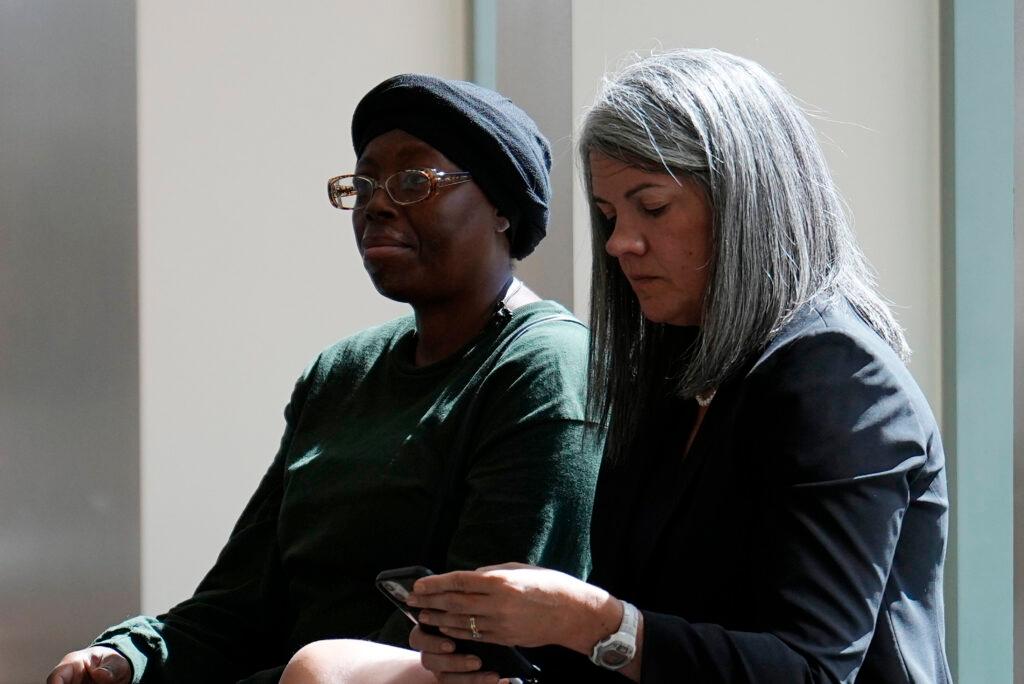
9 a.m.: Sheenen McClain spoke to reporters last week
Elijah McClain's mother, Sheenen, has been at the trial - and nearly all the court proceedings leading up to it. She had told CPR that she wasn't planning on talking to reporters until the trial was over, but after a day of testimony about Elijah McClain's medical condition after being forcibly arrested, she said this:
"They didn't try to save his life.They did everything they could to harm him, to hurt him, to brutalize him, to terrorize him and then to cover it up.
I said I wasn't gonna say nothing until this was over. But damn, the truth is what's real and all this other stuff that they trying to do parade around here like they deserve to breathe. No, they don't. None of them deserve to breathe.
But it's left in the hands of a jury that are not of my peers and a judge who didn't come from my neighborhood."
Read previous coverage of Sheenen and her almost singular mission defending her late son’s name while quietly fighting to reform the police.
— CPR News staff
Monday, Sept. 25
8:33 a.m.: The court is closed in observance of Yom Kippur
The trial will resume Tuesday with the cross-examination of Dr. David Beuther, the lung and asthma pulmonologist who examined Elijah McClain’s lungs, medical records and the body-worn camera footage.
Get a breakdown of the events that led up to the trial with this audio documentary on "The life and death of Elijah McClain" from Colorado In-Depth.
— CPR News staff
Friday, Sept. 22
4:55 p.m.: The court is in recess for the day. Trial will resume on Tuesday, Sept. 26.
The cross-examination of Dr. David Beuther will continue next week. The court is closed on Monday in observance of Yom Kippur.
— CPR News staff
4:43 p.m.: Testimony from pulmonologist who reported to the grand jury in 2021 about McClain's medical condition
An international lung and asthma pulmonologist who examined Elijah McClain’s lungs, medical records and the body worn camera footage said on Friday that McClain had inhaled a potentially fatal amount of fluid from vomit during his arrest.
Dr. David Beuther, a pulmonary critical care physician at National Jewish Health, told an Adams County jury that he filed both an initial and supplemental report on McClain’s death in a grand jury investigation in 2021. Beuther reviewed McClain’s extensive medical records, images, x-rays and police camera footage.
He also examined the mask McClain wore the night he was forcibly arrested in 2019 by three Aurora Police officers and then given ketamine by two Aurora Fire Rescue paramedics. He was declared brain dead and died in the hospital. Beuther said it was a fleece mask that covered McClain’s face except for small openings for his eyes, mouth and nose.
Those five first responders face charges in McClain’s death. This week marked the start of the first trial for the two backup officers on the scene, Randy Roedema and Jason Rosenblatt.
— CPR News staff
4:09 p.m. Support for Elijah's mother, Sheneen
Aurora NAACP Chapter President Omar Montgomery just showed up in the courtroom to support Sheneen McClain during extremely difficult body work camera footage all day long of her son struggling to breathe. Sheneen has been crying throughout the day. They were talking quietly on a bench outside the courtroom during a break.
— Justice reporter Allison Sherry
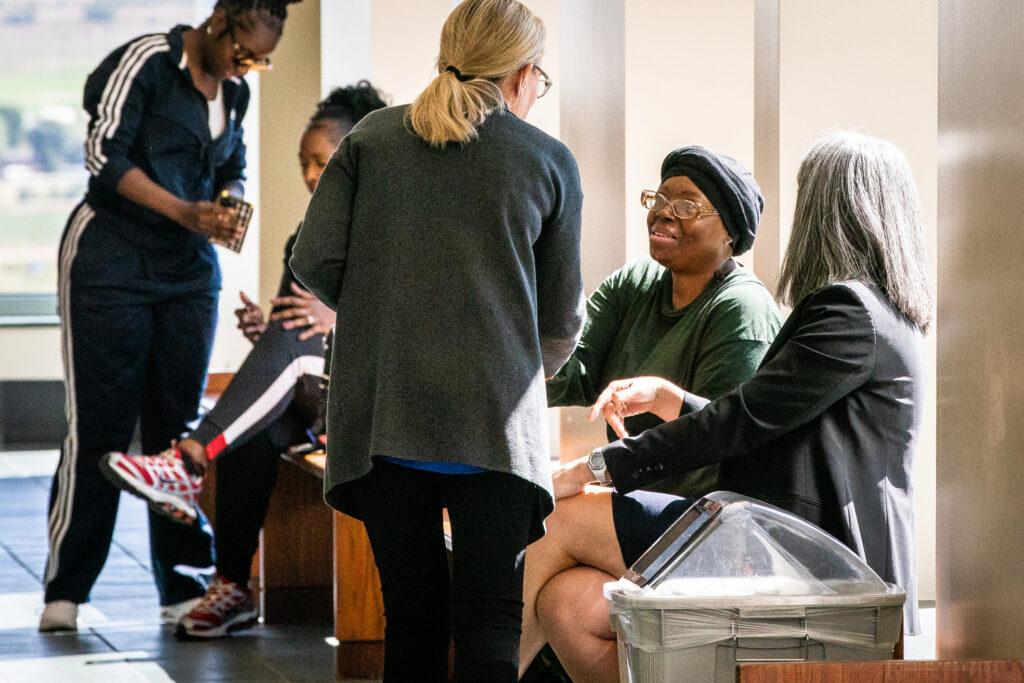
3:59 p.m. Previous coverage on Elijah McClain's autopsy
Attorneys representing the police officers and paramedics are likely to point to McClain’s autopsy as the reason their clients should be acquitted.
Initially, the Adams County coroner signed off on an autopsy performed by a contract pathologist who called McClain’s cause and manner of death “undetermined.” But during the secretive grand jury proceedings last year, that autopsy was changed by the same pathologist to death by ketamine. The manner of death is still undetermined. Read that story here.
— CPR News staff
1:37 a.m.: Who is on the jury?
Aside from what we can tell by looking at the jury, we don't know some of the demographic information about the people who are serving in this trial. Colorado Public Radio reached out to the Adams County Justice Center for the questionnaire that each juror fills out for some additional information. Spokesperson Jon Sarche said via email that Judge Mark Warner hasn’t authorized their release, but he expects it to be available, but doesn't have a timetable.
— Justice reporter Tony Gorman
11:20 a.m.: More body cam footage and another doctor on the stand
The prosecution has continued to play body-worn camera footage from other officers in between calling witnesses. Now on the stand is Dr. David Beuther, a pulmonologist at National Jewish Health. He investigated the death of Elijah McClain - how it happpened and why it happened. One of the things he concluded was that McClain's asthma did not contribute to his death.
— CPR News staff
10 a.m.: First witness of the day takes the stand
Dr. Marc Moss has taken the stand for the prosecution. He is a pulmonary doctor at UCHealth in Aurora and also works in the intensive care unit and cares for patients on ventillators. He treated Elijah McClain and became his primary attending physician the day after McClain was admitted in 2019.
— CPR News staff
9:15 a.m.: Prosecution plays body-cam footage
On Friday morning, the prosecution played the body-worn camera video from former Aurora Police Officer Nathan Woodyard. He was the first officer to stop Elijah McClain and faces the same charges that Randy Roedema and Jason Rosenblatt are being tried for now: criminally negligent homicide, manslaughter and assault. They have pleaded not guilty. They also played the individual body-worn footage from Roedema and Rosenblatt, including portions which were played in slow-motion.
— CPR News staff
Thursday, Sept. 21
4:35 p.m.: Court is in recess
After another hour of contentious back and forth over body-worn camera video, which included going over time stamps and the difference between cameras down to the seconds, Judge Mark Warner called it a day.
— CPR News staff
3:28 p.m.: Three-hour fight over body-camera video
There has been a lot of arguing and back and forth on the so-called master sync, which is an enhanced body-worn camera video that David Notowitz, a specialist out of California, did. The defense wants to know exactly how the footage is enhanced. The prosecutors say the jury will see the originals and the enhanced version. We’re in hour 3 of this fight.
Attorneys from both sides have approached the bench for lengthy conversations with the judge at least a half-dozen times over the enhanced video and objections against it.
The defense team also said they didn’t receive any of the prosecution’s list and CDs of their exhibits. The prosecution said they tried streamlining those exhibits, but the defense was resistant to exchanging copies. They also said the defense has electronic copies.
– Justice reporters Allison Sherry and Tony Gorman
2:47 p.m.: Jury's racial makeup concerns community activist
Local community activist and political strategist Hashim Coates is concerned about the racial makeup of the jury.
Adams County, where the pool of 250 potential jurors who were randomly selected live, is about 46 percent white, according to 2022 U.S. Census data. Hispanic people make up the second largest ethnic group in the county, with 42 percent. Black people, Asian people and other ethnicities make up the remaining percentage of residents.
However, the jury selected in the trial of two officers involved in the death of Elijah McClain appears to be majority white. One juror told the court during selection he was an Asian man.
Coates has kept up with the case, noting he thinks most Coloradans have. But he said people of color are good at compartmentalizing personal beliefs when tasked with a legal duty.
“It might be harder from an emotional standpoint, from understanding the historic nature of the criminal legal system and how it's been weaponized against Black people who have been caught up in that and disproportionate sentencing,” Coates said. “That might create some barriers, but I don't believe those barriers are any more insurmountable.”
– General assignment reporter Paolo Zialcita
2:06 p.m. Quiet around the courthouse in Brighton
The energy, the excitement, the vitriol, the emotion that one might expect inside courtroom 402 at the Adams County Justice Center – where two of the officers implicated in the death of Elijah McClain are standing trial — just wasn’t there Thursday.
On the first full day of testimony, a room that could hold about 80 people was about half filled, making the need for an overflow room unnecessary. Reporters or interested people scared away by reports of need for security and lack of seating could have easily found space. It didn’t look like there were any press who’d come from other countries.
Outside the courtroom in the suburban community about 20 miles outside of Denver, there were no protestors, no difficulty finding someplace to park, and only one satellite truck from local media.During most of the morning, the mood in the courtroom was subdued, with no indication that the trial was connected to an important moment in Colorado’s history that generated huge protests and shut down a highway in 2020.
— Race and diversity reporter Elaine Tassy

12:30 p.m.: Here's what we know about the jury
After four days, the jury was selected in the trial of two of the officers involved in the 2019 death of Elijah McClain. On Wednesday, the court dismissed all but 14 people — a 12-person jury and two alternates. Multiple delays in the process caused opening statements to be pushed back into Wednesday afternoon. The jury was sworn in at 2:44 p.m. and the trial began about 10 minutes later.
There are seven men and seven women, and the jury appears to be mostly white. One juror is an Asian male who told the court during selection that a language barrier could prevent him from making a correct decision.
Potential jurors who were dismissed included a woman who identified as Hispanic. She said that her husband was singled out for an arrest in a conflict with white people. Another juror who was removed is a former EMT who is in the medical field and her father is a police officer.
Another person in the original jury pool — a person of color and former employee of a nursery home — said he lives in the same area as Elijah McClain did. He said he has been stopped multiple times on the way home from work. District Judge Mark Warner asked him to speak with him in his chambers which caused a delay in selection. He was eventually released.
There were at least three black potential jurors in the 250-person pool during selection. All three were excused from duty on Tuesday. One of them was excused because he’s an employee of a law enforcement agency.
— Justice reporter Tony Gorman and the Associated Press
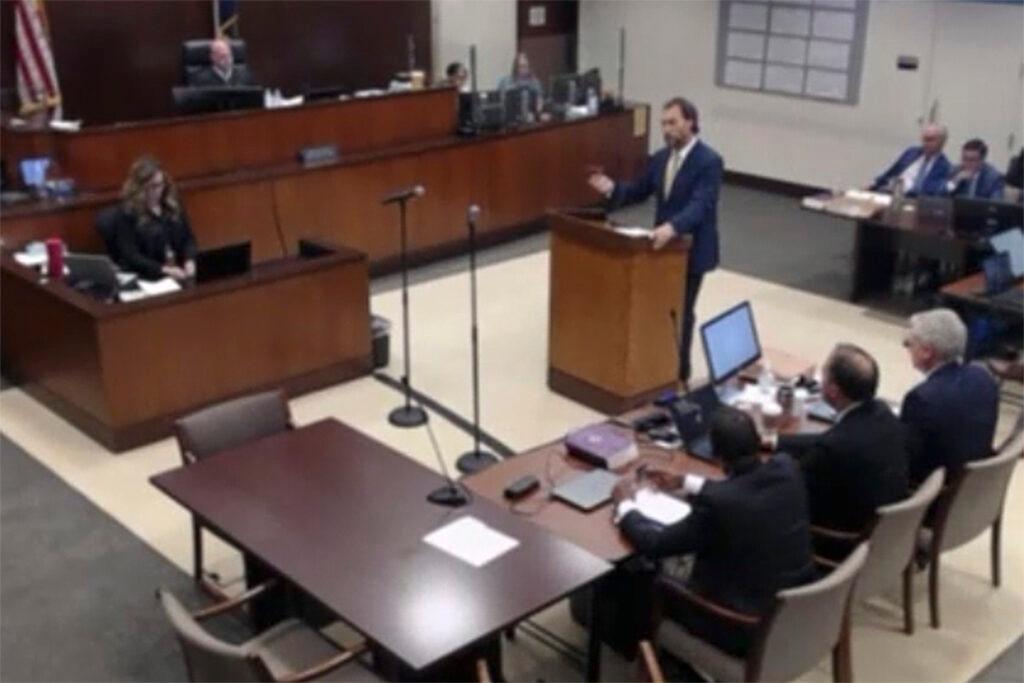
11:29 a.m.: Audio and visual forensic expert called to the stand
The prosecution has called David Notowitz, an audio and video forensic expert and founder and president of the National Center for Audio and Video Forensics. So far, the questions revolve around enhancing and editing sound and video recording. He is an award winning film producer whose company has worked on cases investigated by police officers, detectives, private investigators, insurance investigators, public defenders, and criminal attorneys in multiple states. His largest clients included Target, Kroger, State Farm, Home Depot, and McDonalds.
— CPR News staff
9:49 a.m.: Prosecution calls first witness
Aurora Police Lt. DJ Tisdale is on the stand answering questions about the use of officers' body-worn cameras and how videos are uploaded, cateloged and reviewed at the police department.
— CPR News staff
8:30 a.m.: Colorado In-Depth: The life and death of Elijah McClain
Even if you've followed the news for the past few years, or marched in the protests and chanted Elijah McClain's' name, you may not remember much about his life, or know how we got to the point where officers and paramedics are going on trial. Check out a new audio documentary from CPR News. It's called "The life and death of Elijah McClain: What have we learned?" His death has taught Coloradans what needs to change, to hold law enforcement accountable for bad policies and actions — and what happens when we don't fulfill our watchdog role.
— CPR News staff
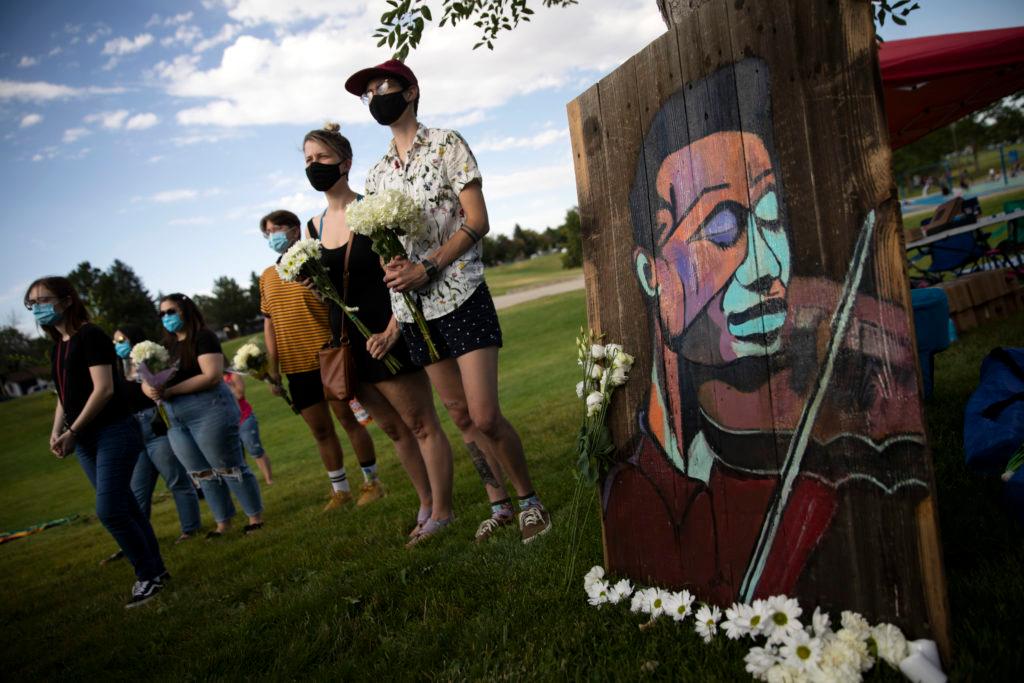
Wednesday, Sept. 20
Whether Elijah McClain’s death came down to egregious recklessness in ignoring police training, a mishandled series of carotid holds or a large dose of ketamine is going to be what jurors will ultimately have to wrestle with in the first trial for McClain’s death in Adams County.
Opening arguments on Wednesday marked the start of the trial for Randy Roedema and Jason Rosenblatt, two officers who were second and third on the scene the night McClain was forcibly arrested in 2019 in Aurora. He was restrained by three officers and then given ketamine by paramedics. He lost his pulse on the scene and later died at the hospital.
The officers face charges of criminally negligent homicide, manslaughter and assault. They have pleaded not guilty.
Prosecutors said that Roedema and Rosenblatt repeatedly ignored their training on use of force and attending to people — even those they are arresting — when they say they can’t breathe, which McClain yelled out seven times.
— Justice reporter Allison Sherry

4:50 p.m. Opening statements wrap up, court is adjourned for the evening.
Jonathan Bunge, a member of the prosecution team, told the jury that Elijah McClain, "a 23-year-old healthy man, just walking down the street became a casualty of the very people who had sworn to protect him."
Randy Roedema's and Jason Rosenblatt's defense lawyers both pushed back against the claim, saying that their actions were in accordance with their training and that the paramedics were the ones who gave Elijah McClain a fatal dose of ketamine, a powerful sedative.
— CPR News staff
3:03 p.m.: Opening statements begin
The prosecution is presenting their case first.
— CPR News staff
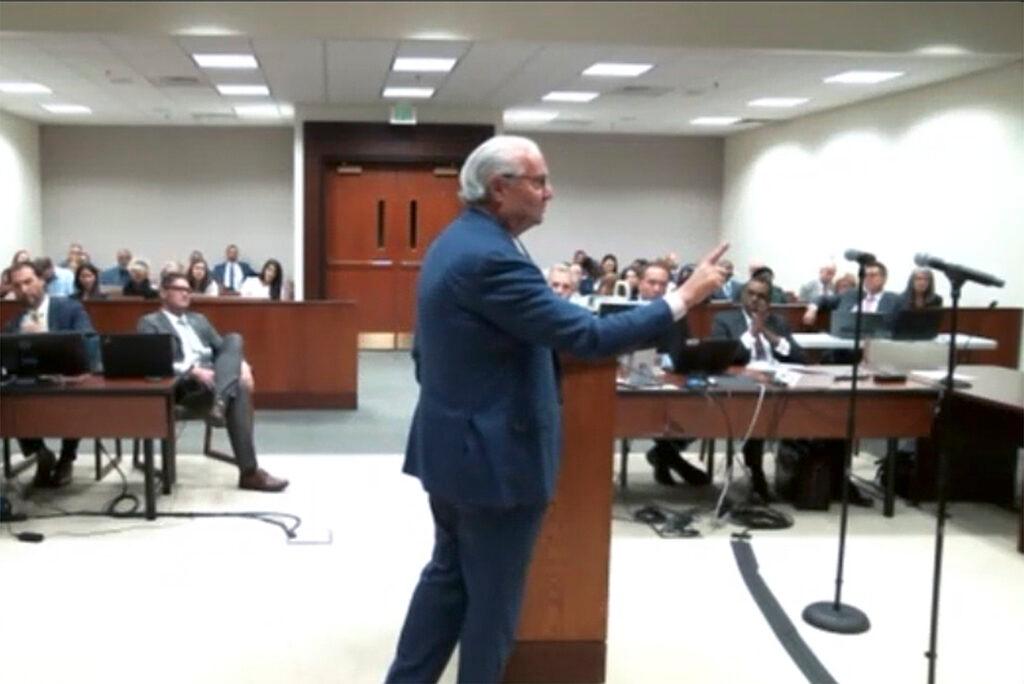
2:57 p.m.: The jury is seated in the courtroom.
There are seven men and seven women on the 12-person jury with two alternates.
— CPR News staff
2:48 p.m.: Judge swears in 14-member jury. Opening statements to begin shortly
People v Rosenblatt and Roedema: Following an extensive jury selection (thus the delays today), Judge Warner has sworn in the 14-member jury and read the introductory remarks. Opening statements will begin at 255
— CO Courts (@CoCourts) September 20, 2023
— CPR News staff
1:10 p.m.: Arguments in judge's chambers before lunch break
I am standing outside the Adams County Justice Center in Brighton, where everyone is taking a lunch break during jury selection in the first trial in the death of Elijah McClain. This process has been multiple days already as defense and prosecutors argue about the composition of the jury.
Right before we broke for lunch, the judge pulled juror number 14 back into his chamber for questioning. This is a juror who is a man of color, who told lawyers yesterday that he had been stopped and racially profiled by police. He was struck by defense, but there's been apparently some arguments about that. But because this is all happening in the judge's chambers, it's not something that reporters know much about at this point.
— Justice reporter Allison Sherry
12:05 p.m.: Opening statements are expected to begin at 1:30 p.m.
People v Rosenblatt and Roedema: the jury has been excused for lunch. They will return at 1:30 pm at which time we expect to begin opening statements.
— CO Courts (@CoCourts) September 20, 2023
— CPR News staff
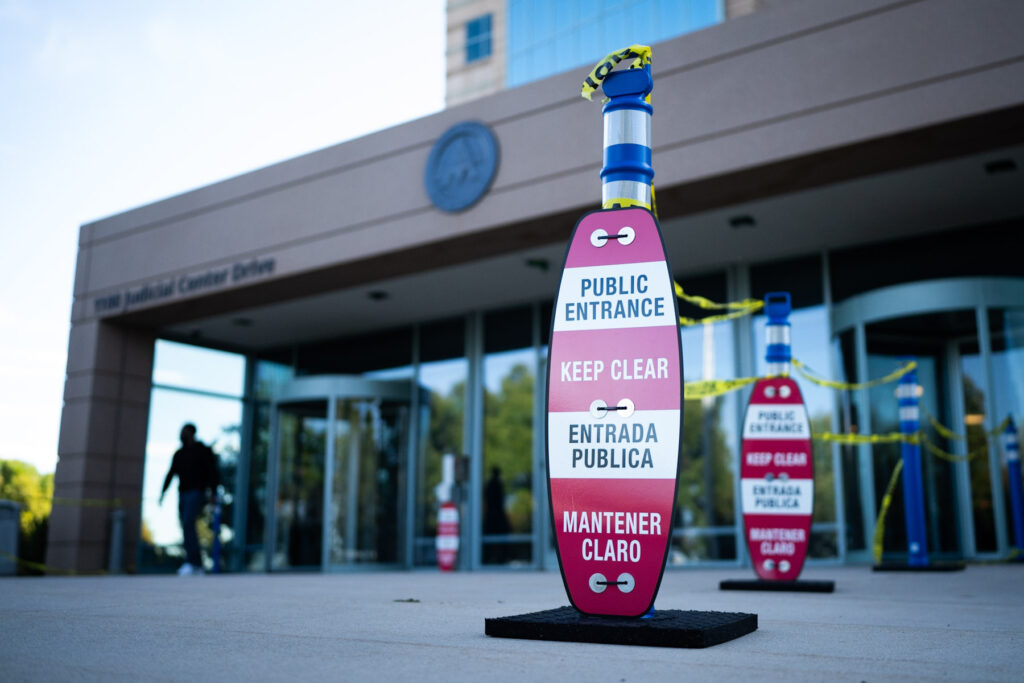
10:50 a.m.: A jury has been empaneled and opening arguments will soon begin.
People v Rosenblatt and Roedema: a jury has been empaneled. Openings will take place momentarily. Please standby…https://t.co/lLIXl9WFJA
— CO Courts (@CoCourts) September 20, 2023
— CPR News staff
4 a.m.: The jury pool is down to 41 potential jurors.
The racial makeup of jurors became a sticking point on Tuesday at the Adams County Justice Center in Brighton and led to some tense moments in the courtroom.
Prosecutors said they believed the defense wanted to exclude a juror of color who had expressed sympathy for McClain. They issued a Batson challenge — an objection to a party's use of a peremptory strike to exclude a juror from the jury pool on the basis of race. The defense accused the prosecution of racism. That juror was eventually dismissed.
Questioning was similar to Monday’s and dealt with relationships with law enforcement officers, media influence and previous encounters with law enforcement.
— Justice reporter Tony Gorman
Tuesday, Sept. 19
4 a.m.: On Monday, potential jurors answered questions about ties to law enforcement and what they know about the night Elijah McClain died.
As the jury pool is winnowed down to the 12 people and two alternates who will eventually serve in the trial of two police officers facing charges in the death of Elijah McClain, two lines of questioning have taken shape: what ties potential jurors have to law enforcement and whether they’ve seen media coverage of the case.
— Systems editor Alison Borden and general assignment reporter Paolo Zialcita
Monday, Sept. 18
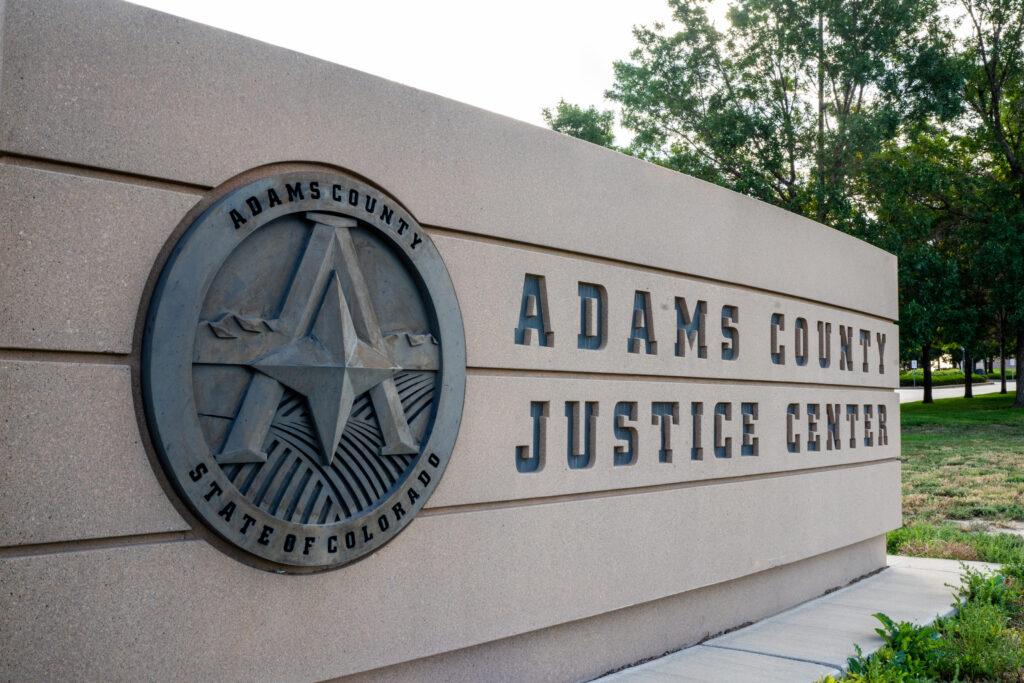
11:46 a.m.: 250 prospective jurors are being questioned for a seat in the first of three trials in the death of Elijah McClain.
Both defense and prosecutors are quizzing 250 potential jurors Monday in this first trial that is expected to start later this week. Two police officers face criminally negligent homicide, manslaughter and assault charges in McClain’s death.
McClain died in 2019 a few days after three officers forcibly arrested him and then he was given a large dose of ketamine by paramedics.
— Systems editor Alison Borden
Friday, Sept. 15
4 a.m.: Jury selection for officers who were part of Elijah McClain’s arrest has begun
As jury selection has begun in the first trial in the death of an unarmed Black man in Aurora, the burden will be on state prosecutors to prove beyond a reasonable doubt that two Aurora police officers confronted a healthy, innocent 23-year-old man named Elijah McClain, and, in forcibly arresting him, were among those responsible for his death.
Three others involved in McClain’s arrest will face similar charges later but the state’s evidence will get its first test in this trial of Jason Rosenblatt and Randy Roedema — both officers arrived moments after their colleague Aurora Police Department officer Nathan Woodyard made initial contact with McClain on a street in August 2019.
— Justice reporter Allison Sherry
Editor's Note: Previous versions of updates in this live blog misspelled the name of witness Dr. Marc Brown.
A previous version of this blog misstated which officers were fired for the "selfie incident."








